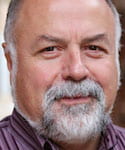Statistician Marek Kimmel leads effort to model viral mutations, aid vaccine design
By Patrick Kurp
Special to the Rice News
Marek Kimmel, a professor and associate department chair of statistics at Rice, has received a $100,000 National Science Foundation (NSF) Rapid Response Research grant to investigate how the SARS-CoV-2 virus is likely to evolve in humans.

Marek Kimmel
Kimmel’s proposal is titled “Mathematical Tools for Analysis of Genomic Diversity of SARS-CoV-2 Virus in the Context of Its Co-Evolution with Host Populations.” Rapid Response grants are awarded to research proposals judged to have “severe urgency.”
Kimmel’s research focuses on probabilistic modeling and statistical analysis in the biosciences.
“We need novel statistical and computational techniques to extract the information available in the viral RNA sequences now available from infected patients all around the world,” he said. “We’ll focus on describing the mechanisms by which mutations accumulate in the viral genome, partly through interacting with their hosts.”
Kimmel, his postdoctoral research associates and international collaborators will develop statistical approaches for comparing and contrasting these mechanisms. Understanding how mutations in the viral genomes accumulate will offer better insight into the nature of various strains of the virus that will survive in humans. Such knowledge can aid in the design of vaccines for COVID-19.
“We intend to reconstruct the evolutionary past of the SARS-CoV-2 virus and of the bat viruses from which it likely descended, and use it to infer the coronavirus family’s evolutionary potential for enabling recurrences,” he said. “We will take into account the evolution of the human population and animal virus resistance.”
Researchers can then estimate the drift, mutation and selection patterns of the virus in the host population. That will further understanding of how the evolution of the virus is driven by that of its host.
The grant is awarded using funds made available by the Coronavirus Aid, Relief, and Economic Security (CARES) Act to NSF’s Directorate of Mathematical and Physical Sciences. It is a collaborative grant with Simon Tavaré, professor of biological sciences and statistics at Columbia University.
– Patrick Kurp is a science writer in the George R. Brown School of Engineering.

